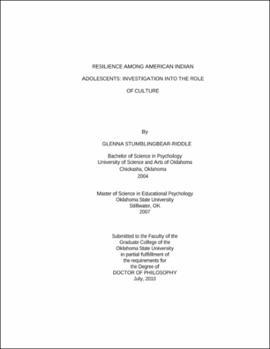| dc.contributor.advisor | Romans, John S. C. | |
| dc.contributor.author | Stumblingbear-Riddle, Glen | |
| dc.date.accessioned | 2013-11-26T08:27:46Z | |
| dc.date.available | 2013-11-26T08:27:46Z | |
| dc.date.issued | 2010-07 | |
| dc.identifier.uri | https://hdl.handle.net/11244/6977 | |
| dc.description.abstract | Scope and Method of Study: Exploratory Research Study | |
| dc.description.abstract | Findings and Conclusions: | |
| dc.description.abstract | In this study Resilience was regressed on Enculturation, Self-Esteem, Subjective Well-Being, and Social Support from Family and Friends. The researcher�s findings demonstrated that 7% of the total variance in Resilience was explained by Enculturation. Further, 33% of the total variance in Resilience was accounted for by Enculturation, Self-Esteem, and Social Support from Family and Friends, while 34% of the total variance in Resilience was contributed by Enculturation, Subjective Well-Being, and Social Support from Family and Friends. However, Social Support from Friends served as the strongest predictor considering all variables. Additionally, the correlation coefficients tended to reach statistical significance. Notably, results demonstrated a large, negative relationship between Self-Esteem and Subjective Well-Being [r=-.50, p<.01]. A medium, positive relationship between Social Support from Friends and Resilience [r=.48, p<.01, 23% shared variability]. This study demonstrated how the experiences of American Indian adolescents living in urban settings need to be further explored, especially in regards to social support from friends. The role of culture assessed by level of enculturation appeared to operate differently among urban American Indian adolescents. Specifically, culture appeared important but the role of social support from friends remained as the strongest predictor of resilience. It is concluded that the role of friends may be especially critical in urban settings, as tribal communities and resources are less prominent and accessible in urban areas. Implications are provided in terms of prevention within school systems and among tribal communities and mental health professionals. | |
| dc.format | application/pdf | |
| dc.language | en_US | |
| dc.rights | Copyright is held by the author who has granted the Oklahoma State University Library the non-exclusive right to share this material in its institutional repository. Contact Digital Library Services at lib-dls@okstate.edu or 405-744-9161 for the permission policy on the use, reproduction or distribution of this material. | |
| dc.title | Resilience among American Indian adolescents: Investigation into the role of culture | |
| dc.contributor.committeeMember | Boswell, Don | |
| dc.contributor.committeeMember | Clark, Julie Dorton | |
| dc.contributor.committeeMember | Perry, Katye | |
| dc.contributor.committeeMember | Winterowd, Carrie | |
| osu.filename | StumblingbearRiddle_okstate_0664D_10962.pdf | |
| osu.accesstype | Open Access | |
| dc.type.genre | Dissertation | |
| dc.type.material | Text | |
| dc.subject.keywords | enculturation | |
| dc.subject.keywords | resilience | |
| dc.subject.keywords | self-esteem | |
| dc.subject.keywords | social support | |
| dc.subject.keywords | subjective well-being | |
| dc.subject.keywords | urban american indian adolescents | |
| thesis.degree.discipline | Counseling Psychology | |
| thesis.degree.grantor | Oklahoma State University | |
